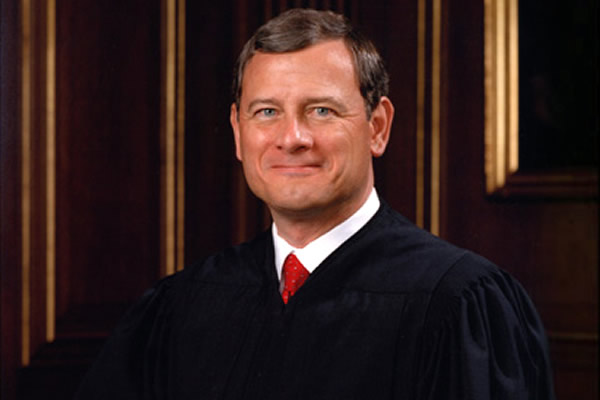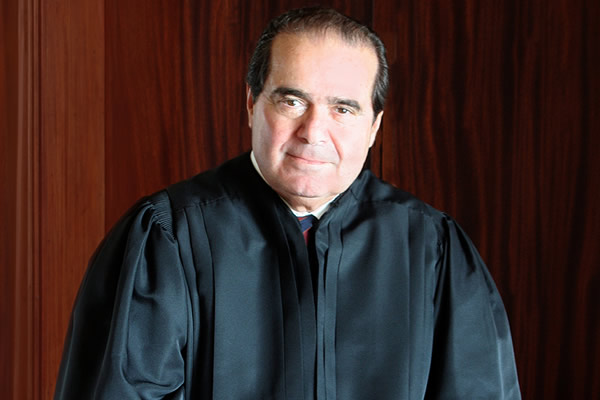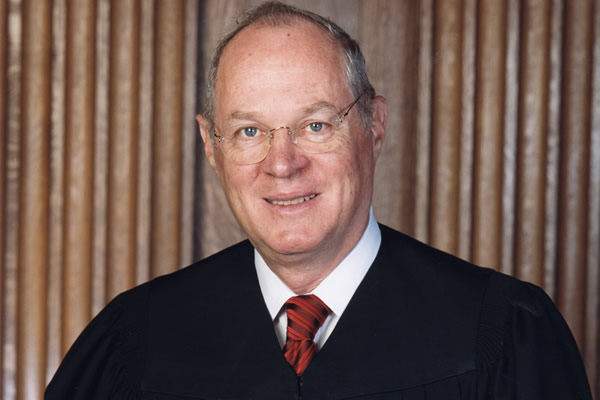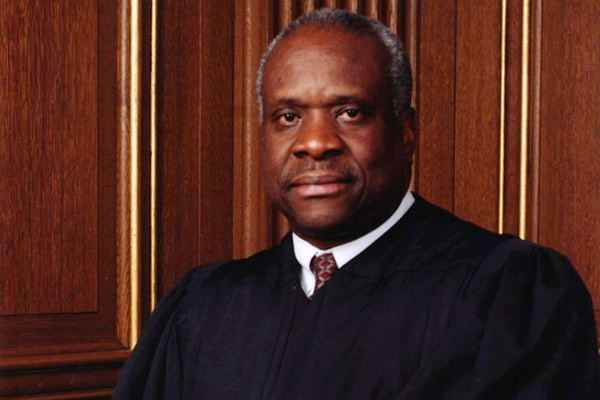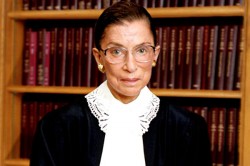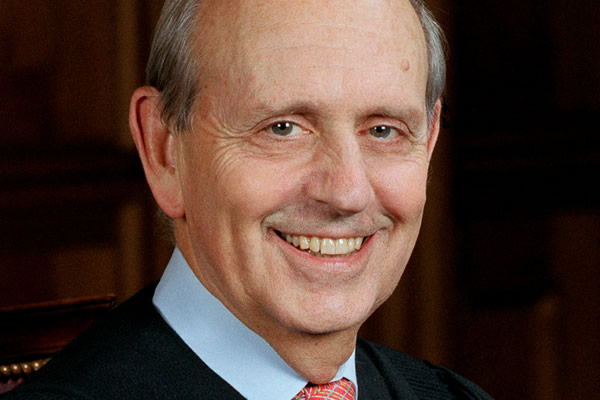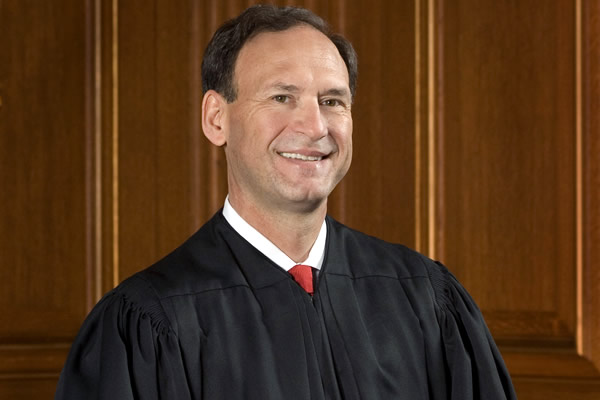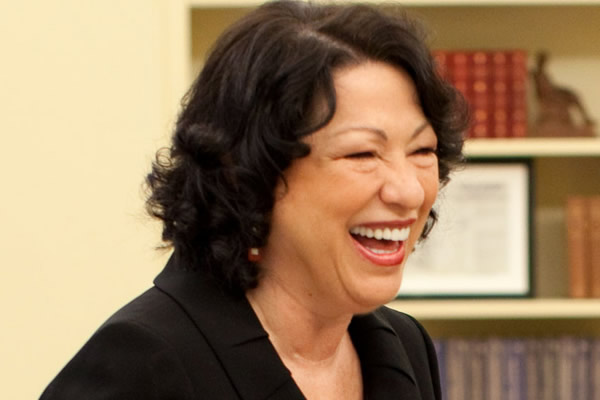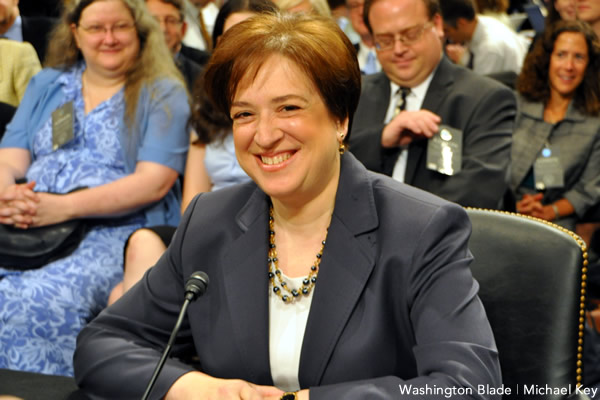National
How will Supreme Court rule on marriage?
Parsing statements, records for hints as to how justices will decide DOMA, Prop 8 cases
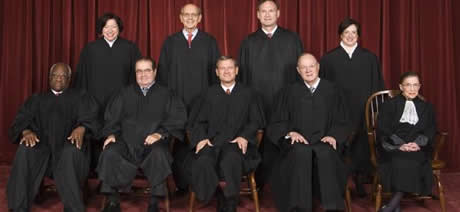
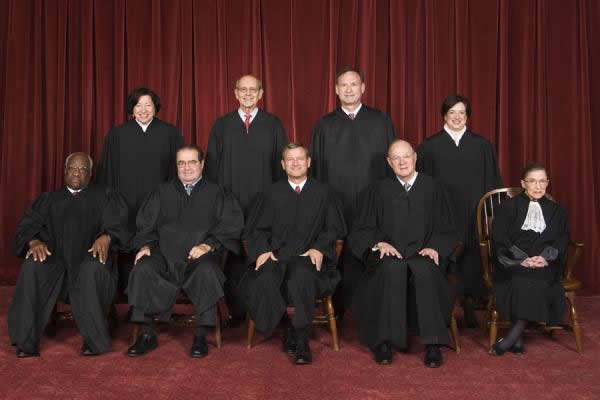
Justices on the U.S. Supreme Court are expected to issue rulings on the Prop 8 and DOMA cases in June. (Photo public domain)
The nine members of the U.S. Supreme Court are expected to reach a decision by the end of June in two high-profile LGBT rights cases on which they heard oral arguments last week challenging California’s Proposition 8 and the federal Defense of Marriage Act.
The justices could reach any number of decisions on either or both of the cases — upholding the anti-gay measures, dismissing the cases for lack of standing or jurisdiction, striking down Prop 8 and DOMA on grounds they violate the rights of same-sex couples under the U.S. Constitution — or even issuing a national ruling in favor of marriage equality.
Predicting how they might rule is tricky. But several of the justices made statements and asked questions during the oral arguments that offered some hints. Perhaps more significantly, many of them have a record of ruling in gay rights cases that might indicate their leanings on marriage. The Washington Blade has compiled profiles of the justices to assess how they might rule in the two marriage cases before them.
In addition to examining their comments during the arguments, the Blade has looked at how they ruled in other high-profile gay rights cases. One is the 1996 case of Romer v. Evans in which the Supreme Court struck down Colorado’s Amendment 2, which would have prohibited municipalities from passing non-discrimination ordinances protecting LGBT people. Another is the 2003 case of Lawrence v. Texas in which the Supreme Court struck down state sodomy laws.
The Blade also looked at the court ruling in the 2010 case of Christian Legal Society v. Martinez. In that case, the court upheld the Hastings College of Law’s non-discrimination policy against a challenge from Hastings Christian Fellowship, which sought to overturn the policy to maintain its status as an official school group while prohibiting LGBT people from holding positions as officers.
1. Chief Justice John Roberts
The chief justice of the Supreme Court seemed skeptical during oral arguments that Prop 8 and DOMA should be struck down as unconstitutional. He also seemed dismissive of the notion that LGBT people lack political power.
In an exchange with attorney Robbie Kaplan, Chief Justice John Roberts disputed that gay people lack political power — a characteristic that the court has considered in weighing whether a group should be considered a suspect class.
“As far as I can tell, political figures are falling over themselves to endorse your side of the case,” Roberts said.
The chief justice was likely referring to the trend of U.S. senators announcing their support for marriage equality, which just this week added Sens. Bob Casey (D-Pa.), Tom Carper (D-Del.) and Mark Kirk (R-Ill.). When Kaplan pointed out that no group has been subject to referenda in recent years like gay people, Roberts seemed unmoved.
“You just referred to a sea change in people’s understandings and values from 1996, when DOMA was enacted, and I’m just trying to see where that comes from, if not from the political effectiveness of groups on your side,” Roberts said.
Roberts, who was appointed by President George W. Bush, hasn’t ruled on many gay rights cases during his time on the bench. Still, Roberts ruled as part of the dissent that deemed exclusion of LGBT students was acceptable in the Christian Legal Society case.
On the other hand, Roberts in 1996 helped gay rights activists as part of his law firm’s pro bono work in preparation for the Romer case. He also has a lesbian cousin, Jean Podrasky, who attended arguments on Prop 8.
Suzanne Goldberg, a lesbian and co-director of Columbia University’s Center for Gender & Sexuality Law, pointed to another comment Roberts made indicating a parent forcing a child to make friends with another child changes the definition of friendship.
“It suggested that he might be less open to recognizing marriage rights for same-sex couples than the Olson-Boies team had anticipated,” Goldberg said.
2. Associate Justice Antonin Scalia
Associate Justice Antonin Scalia, viewed by many as the most anti-gay of the justices, mused that being raised by gay parents may not be good for a child — an argument made by many anti-gay groups.
“If you redefine marriage to include same-sex couples, you must permit adoption by same-sex couples, and there’s considerable disagreement among sociologists as to what the consequences of raising a child in a single-sex family, whether that is harmful to the child or not,” Scalia said. “Some states do not permit adoption by same-sex couples for that reason.”
Those words are consistent with anti-gay views that Scalia has expressed in the past. Most notably, speaking at Princeton in December, Scalia compared bans on sodomy to laws against murder, saying, “If we cannot have moral feelings against homosexuality, can we have it against murder? Can we have it against other things?”
Since his confirmation to the court, Scalia has not only made anti-gay rulings, but has taken the lead on the opinions. The Reagan-appointed justice wrote the dissenting opinions in the Romer and Lawrence cases and joined with other dissenting justices in ruling for LGBT exclusion in the Christian Legal Society case.
Doug NeJaime, who’s gay and a professor at Loyola Law School, said Scalia is likely to rule to uphold Prop 8 and the Defense of Marriage Act.
“Justice Scalia has made clear in earlier opinions … that legislation can be justified merely by moral disapproval of homosexuality, even though a majority of the court has rejected that position,” NeJaime said. “Moreover, under his theory of constitutional interpretation, he does not believe that lesbians and gay men have a constitutional basis for their claims in these cases.”
3. Associate Justice Anthony Kennedy
The justice who’s being most closely watched because of his reputation for being a swing vote — and his previous rulings in favor of gay rights — conveyed mixed sentiments during the arguments.
Associate Justice Anthony Kennedy contemplated the effect that overturning or sustaining Prop 8 would have on children based on the newness of same-sex marriage.
“We have five years of information to weigh against 2,000 years of history or more,” Kennedy said. “On the other hand, there is … what could be a legal injury, and that’s the voice of these children. There are some 40,000 children in California … that live with same-sex parents, and they want their parents to have full recognition and full status.”
A Reagan appointee, Kennedy authored the majority opinions in the Romer and Lawrence cases that struck down anti-gay measures in those lawsuits. In the Christian Legal Society case, Kennedy also ruled in favor of requiring student groups to be open to all students regardless of LGBT status.
That’s what makes Kennedy’s comment questioning the Ninth Circuit ruling against Prop 8, which was largely based on his opinion in Romer, particularly noteworthy.
“The rationale of the Ninth Circuit was much more narrow,” Kennedy said. “It basically said that California, which has been more generous, more open to protecting same-sex couples than almost any state in the union, just didn’t go far enough, and it’s being penalized for not going far enough. That’s a very odd rationale on which to sustain this opinion.”
Nan Hunter, a lesbian law professor at Georgetown University, said the “single most powerful vibe” she received from Kennedy during arguments was his ambivalence.
“My best guess is that in the Perry case, he will rule in some way that avoids discussion of Prop 8’s constitutionality and that in the Windsor case, he will conclude that DOMA is unconstitutional, but his opinion may invoke federalism as much as it does the Equal Protection Clause,” Hunter said.
4. Associate Justice Clarence Thomas
In accordance with his custom, Associate Justice Clarence Thomas remained silent for the duration of oral arguments in the marriage cases.
Thomas is known for not asking questions. In January, after seven years of silence, the George H.W. Bush-appointed justice made news when he broke his tradition and cracked a joke about the competency of an attorney during a case unrelated to marriage.
But Thomas has a history of taking the anti-gay side. He ruled in the dissent in the Romer and Lawrence cases and ruled for LGBT exclusion in the Christian Legal Society case.
Chris Stoll, a senior staff attorney for the National Center for Lesbian Rights, said oral arguments don’t offer any information on how Thomas might rule, but noted the justice’s history of anti-gay opinions.
“He is quite conservative and historically has voted with the other conservative justices in cases involving LGBT equality,” Stoll said.
5. Associate Justice Ruth Bader Ginsburg
One justice who has a history of ruling in favor of gay rights indicated a disdain for DOMA during oral arguments.
Associate Justice Ruth Bader Ginsburg said the 1996 law creates two different kinds of unions for same-sex and opposite-sex couples: “the full marriage, and then this sort of skim milk marriage.”
While questioning attorney Paul Clement, Ginsburg more distinctly articulated the problems for gay couples under DOMA by enumerating benefits denied to them under the law.
“The problem is if we are totally for the states’ decision that there is a marriage between two people, for the federal government then to come in to say no joint return, no marital deduction, no Social Security benefits; your spouse is very sick but you can’t get leave; people — if that set of attributes, one might well ask, what kind of marriage is this?” Ginsburg said.
Ginsburg also has a history suggesting she’d be willing to rule against Prop 8 and DOMA. The Clinton-appointed justice ruled in favor of LGBT advocates in the Romer, Lawrence and Christian Legal Society cases. Prior to her confirmation as a Supreme Court justice, Ginsburg was a women’s rights advocate and co-founder of the women’s rights project at the American Civil Liberties Union.
David Gans, civil rights director for the progressive Constitutional Accountability Center, said he considers Ginsburg a likely vote to strike down DOMA and Prop 8 based on her history of rulings and comments made in court.
“I think her comments tended to be across the board very skeptical of the justifications offered, and, of course, her record, both as an advocate and justice is to honor the constitutional guarantee of equal protection applies to all persons,” Gans said.
6. Associate Justice Stephen Breyer
The other Clinton appointee on the bench also made comments during the Prop 8 arguments suggesting he might rule in favor of marriage rights for gay couples.
Associate Justice Stephen Breyer was dismissive of Cooper’s assertion that marriage is for procreation, observing California allows straight couples who cannot have children to marry.
“What precisely is the way in which allowing gay couples to marry would interfere with the vision of marriage as procreation of children that allowing sterile couples of different sexes to marry would not?” Breyer said. “I mean, there are lots of people who get married who can’t have children.”
And Breyer’s earlier rulings suggest he would be amenable to striking down Prop 8 and DOMA. Breyer joined Kennedy and other justices in the pro-gay rulings for Romer and Lawrence and sided with LGBT inclusion in the Christian Legal Society Case.
Gans said Breyer’s comments during the Prop 8 arguments indicate his rulings on the anti-gay measures will likely be consistent with his earlier decisions.
“Justice Breyer’s questions during oral argument suggested that he would find that discriminatory marriage laws violate the constitutional guarantee of equal protection for all persons,” Gans said.
7. Associate Justice Samuel Alito
Associate Justice Samuel Alito expressed concerns about same-sex marriage, quipping that it’s “newer than cell phones or the Internet.”
“Same-sex marriage is very new,” Alito said. “I think it was first adopted in the Netherlands in 2000. So there isn’t a lot of data about its effect. And it may turn out to be a good thing; it may turn out not to be a good thing, as the supporters of Proposition 8 apparently believe.”
An appointee of President George W. Bush, Alito hasn’t been on the court long enough to have ruled in the earlier landmark Lawrence and Romer cases. But he wrote the dissenting opinion in favor of LGBT exclusion in the Christian Legal Society case.
Lavi Soloway, a gay immigration attorney and co-founder of The DOMA Project, said he expects Alito to be consistent and issue an anti-gay decision in the cases before him — taking note of the exchange in the Prop 8 case.
“This line of thinking was disappointing; it not only belittled the fight for equality, but suggested that Justice Alito would first need to be convinced of the ‘effects’ of same-sex marriage before he could determine whether gay and lesbian Americans have a constitutionally protected right to marry,” Soloway said. “This exchange suggested to me that Alito will most likely vote to uphold Prop 8, preferring that legislatures continue to wrestle with this issue.”
8. Associate Justice Sonia Sotomayor
Another justice — this one appointed by President Obama — asked some of the most pointed questions about whether there’s any reason anti-gay laws could survive the court’s lowest standard of review.
Associate Justice Sonia Sotomayor pressed attorney Charles Cooper on whether he could conceive of anti-gay laws on other issues other than marriage that could survive rational basis review. The answer from Cooper was that he could not.
“If that is true, then why aren’t they a class?” Sotomayor responded. “If they’re a class that makes any other discrimination improper, irrational, then why aren’t we treating them as a class for this one thing?”
Sotomayor’s response suggests she might agree with the Obama administration that laws related to sexual orientation should be subjected to heightened scrutiny, or a greater assumption they’re unconstitutional.
A newcomer to the court, Sotomayor hasn’t had the opportunity to rule on many of the earlier LGBT rights cases that have come before the bench. But in the Christian Legal Society case, she joined four other justices in ruling student groups had to accept all students regardless of LGBT status.
Notably, Sotomayor was the only one among nine justices who responded to a letter from a North Carolina 6th grader named Cameron urging justices to rule in favor of marriage equality. The justice said she had no comment on the marriage cases, but urged Cameron to keep “dreaming big.”
NCLR’s Stoll pointed to Sotomayor’s exchange with Cooper as evidence she’d rule against Prop 8 and had similar expectations for how she’d rule on DOMA.
“She seemed perplexed and unpersuaded by Cooper’s argument that excluding gay people from marriage somehow promotes ‘responsible procreation’ by different-sex couples,” Stoll said.
9. Associate Justice Elena Kagan
Yet another justice appointed by President Obama seemed skeptical about arguments presented by proponents of Prop 8 and DOMA.
Associate Justice Elena Kagan suggested to attorney Paul Clement that Congress may have had another motive other than uniformity when it determined to pass the anti-gay law.
“This was a real difference in the uniformity that the federal government was pursuing,” Kagan said. “And it suggests that maybe something — maybe Congress had something different in mind than uniformity.”
Clement offered a lengthy response in which he talked about federal bans on polygamy and laws after the Civil War allowing freed slaves to marry. But Kagan responded by reading from the House report on DOMA, which states the law was passed “to reflect an honor of collective moral judgment and to express moral disapproval of homosexuality” — deemed a “gotcha” moment that elicited laughter from those in the courtroom.
During the Prop 8 arguments, Kagan was also skeptical of Cooper’s argument that the purpose of marriage is procreation and asked for a legitimate reason for excluding same-sex couples from marriage.
“Is there any reason that you have for excluding them?” Kagan said. “In other words, you’re saying, well, if we allow same-sex couples to marry, it doesn’t serve the state’s interest. But do you go further and say that it harms any state interest?”
Like Sotomayor, Kagan is a relative newcomer to the court and hasn’t had the opportunity to rule on gay cases. During her confirmation hearing, Kagan wouldn’t say whether the she thinks the U.S. Constitution guarantees same-sex couples the right to marry.
Still, Loyola’s NeJaime said Kagan seemed bothered during oral arguments by equal protections concerns presented by Prop 8 and DOMA.
“Given her lengthy questions about the relationship between age and procreative ability, she seems unconvinced by the ‘responsible procreation’ rationale for same-sex marriage bans,” NeJaime said. “And given her reading of the House report on DOMA regarding the ‘moral disapproval of homosexuality,’ she is suggesting that the law may not survive rational basis review.”
Federal Government
Treasury Department has a gay secretary but LGBTQ staff are under siege
Agency reverses course on LGBTQ inclusion under out Secretary Scott Bessent

A former Treasury Department employee who led the agency’s LGBTQ employee resource group says the removal of sexual orientation and gender identity (SOGI) from its discrimination complaint forms was merely a formalization of existing policy shifts that had already taken hold following the second inauguration of President Donald Trump and his appointment of Scott Bessent — who is gay — to lead the agency.
Christen Boas Hayes, who served on the policy team at Treasury’s Financial Crimes Enforcement Network (FinCEN) from 2020 until March of this year, told the Washington Blade during a phone interview last week that the agency had already stopped processing internal Equal Employment Opportunity (EEO) complaints on the basis of anti-LGBTQ discrimination.
“So the way that the forms are changing is a procedural recognition of something that’s already happening,” said Hayes. “Internally, from speaking to two EEO staff members, the changes are already taking place from an EEO perspective on what kind of cases will be found to have the basis for a complaint.”
The move, they said, comes amid the deterioration of support structures for LGBTQ workers at the agency since the administration’s early rollout of anti-LGBTQ executive orders, which led to “a trickle down effect of how each agency implements those and on what timeline,” decisions “typically made by the assistant secretary of management’s office and then implemented by the appropriate offices.”
At the end of June, a group of U.S. House Democrats including several out LGBTQ members raised alarms after a Federal Register notice disclosed Treasury’s plans to revise its complaint procedures. Through the agency’s Office of Civil Rights and EEO, the agency would eliminate SOGI as protected categories on the forms used by employees to initiate claims of workplace discrimination.
But Hayes’s account reveals that the paperwork change followed months of internal practice, pursuant to a wave of layoffs targeting DEI personnel and a chilling effect on LGBTQ organizing, including through ERGs.
Hayes joined Treasury’s FinCEN in 2020 as the agency transitioned into the Biden-Harris administration, working primarily on cryptocurrency regulation and emerging technologies until they accepted a “deferred resignation” offer, which was extended to civil servants this year amid drastic staffing cuts.
“It was two things,” Hayes said. “One was the fact that the policy work that I was very excited about doing was going to change in nature significantly. The second part was that the environment for LGBTQ staff members was increasingly negative after the release of the executive orders,” especially for trans and nonbinary or gender diverse employees.
“At the same time,” Hayes added, “having been on the job for four years, I also knew this year was the year that I would leave Treasury. I was a good candidate for [deferred resignation], because I was already planning on leaving, but the pressures that emerged following the change in administration really pushed me to accelerate that timeline.”
Some ERGs die by formal edict, others by a thousand cuts
Hayes became involved with the Treasury LGBTQ ERG shortly after joining the agency in 2020, when they reached out to the group’s then-president — “who also recently took the deferred resignation.”
“She said that because of the pressure that ERGs had faced under the first Trump administration, the group was rebuilding, and I became the president of the group pretty quickly,” Hayes said. “Those pressures have increased in the second Trump administration.”
One of the previous ERG board members had left the agency after encountering what Hayes described as “explicitly transphobic” treatment from supervisors during his gender transition. “His supervisors denied him a promotion,” and, “importantly, he did not have faith in the EEO complaint process” to see the issues with discrimination resolved, Hayes said. “And so he decided to just leave, which was, of course, such a loss for Treasury and our Employee Resource Group and all of our employees at Treasury.”
The umbrella LGBTQ ERG that Hayes led included hundreds of members across the agency, they said, and was complemented by smaller ERGs at sub-agencies like the IRS and FinCEN — several of which, Hayes said, were explicitly told to cease operations under the new administration.
Hayes did not receive any formal directive to shutter Treasury’s ERG, but described an “implicit” messaging campaign meant to shut down the group’s activities without issuing anything in writing.
“The suggestion was to stop emailing about anything related to the employee resource group, to have meetings outside of work hours, to meet off of Treasury’s campus, and things like that,” they said. “So obviously that contributes to essentially not existing functionally. Because whereas we could have previously emailed our members comfortably to announce a happy hour or a training or something like that, now they have to text each other personally to gather, which essentially makes it a defunct group.”
Internal directories scrubbed, gender-neutral restrooms removed
Hayes said the dismantling of DEI staff began almost immediately after the executive orders. Employees whose position descriptions included the terms “diversity, equity, and inclusion” were “on the chopping block,” they said. “That may differ from more statutorily mandated positions in the OMWI office or the EEO office.”
With those staff gone, so went the infrastructure that enabled ERG programming and community-building. “The people that made our employee resource group events possible were DEI staff that were fired. And so, it created an immediate chilling effect on our employee resource group, and it also, of course, put fear into a lot of our members’ hearts over whether or not we would be able to continue gathering as a community or supporting employees in a more practical way going forward. And it was just, really — it was really sad.”
Hayes described efforts to erase the ERGs from internal communication channels and databases. “They also took our information off internal websites so nobody could find us as lawyers went through the agency’s internal systems to scrub DEI language and programs,” they said.
Within a week, Hayes said, the administration had removed gender-neutral restrooms from Main Treasury, removed third-gender markers from internal databases and forms, and made it more difficult for employees with nonbinary IDs to access government buildings.
“[They] made it challenging for people with X gender markers on identification documents to access Treasury or the White House by not recognizing their gender marker on the TWAVES and WAVES forms.”
LGBTQ staff lack support and work amid a climate of isolation
The changes have left many LGBTQ staff feeling vulnerable — not only because of diminished workplace inclusion, but due to concerns about job security amid the administration’s reductions in force (RIFs).
“Plenty of people are feeling very stressed, not only about retaining their jobs because of the layoffs and pending questions around RIFs, but then also wondering if they will be included in RIF lists because they’re being penalized somehow for being out at work,” Hayes said. “People wonder if their name will be given, not because they’re in a tranche of billets being laid off, but because of their gender identity or sexual orientation.”
In the absence of functional ERGs, Hayes said, LGBTQ employees have been cut off from even informal networks of support.
“Employees [are] feeling like it’s harder to find members of their own community because there’s no email anymore to ask when the next event is or to ask about navigating healthcare or other questions,” they said. “If there is no ERG to go to to ask for support for their specific issue, that contributes to isolation, which contributes to a worse work environment.”
Hayes said they had not interacted directly with Secretary Bessent, but they and others observed a shift from the previous administration. “It is stark to see that our first ‘out’ secretary did not host a Pride event this year,” they said. “For the last three years we’ve flown the rainbow Pride flag above Treasury during Pride. And it was such a celebration among staff and Secretary Yellen and the executive secretary’s office were super supportive.”
“Employees notice changes like that,” they added. “Things like the fact that the Secretary’s official bio says ‘spouse’ instead of ‘husband.’ It makes employees wonder if they too should be fearful of being their full selves at work.”
The Blade contacted the Treasury Department with a request for comment outlining Hayes’s allegations, including the removal of inclusive infrastructure, the discouragement of ERG activity, the pre-formalization of EEO policy changes, and the targeting of DEI personnel. As of publication, the agency has not responded.
U.S. Supreme Court
Supreme Court to consider bans on trans athletes in school sports
27 states have passed laws limiting participation in athletics programs

The U.S. Supreme Court on Thursday agreed to hear two cases involving transgender youth challenging bans prohibiting them from participating in school sports.
In Little v. Hecox, plaintiffs represented by the ACLU, Legal Voice, and the law firm Cooley are challenging Idaho’s 2020 ban, which requires sex testing to adjudicate questions of an athlete’s eligibility.
The 9th U.S. Circuit Court of Appeals described the process in a 2023 decision halting the policy’s enforcement pending an outcome in the litigation. The “sex dispute verification process, whereby any individual can ‘dispute’ the sex of any female student athlete in the state of Idaho,” the court wrote, would “require her to undergo intrusive medical procedures to verify her sex, including gynecological exams.”
In West Virginia v. B.P.J., Lambda Legal, the ACLU, the ACLU of West Virginia, and Cooley are representing a trans middle school student challenging the Mountain State’s 2021 ban on trans athletes.
The plaintiff was participating in cross country when the law was passed, taking puberty blockers that would have significantly reduced the chances that she could have a physiological advantage over cisgender peers.
“Like any other educational program, school athletic programs should be accessible for everyone regardless of their sex or transgender status,” said Joshua Block, senior counsel for the ACLU’s LGBTQ and HIV Project. “Trans kids play sports for the same reasons their peers do — to learn perseverance, dedication, teamwork, and to simply have fun with their friends,” Block said.
He added, “Categorically excluding kids from school sports just because they are transgender will only make our schools less safe and more hurtful places for all youth. We believe the lower courts were right to block these discriminatory laws, and we will continue to defend the freedom of all kids to play.”
“Our client just wants to play sports with her friends and peers,” said Lambda Legal Senior Counsel Tara Borelli. “Everyone understands the value of participating in team athletics, for fitness, leadership, socialization, and myriad other benefits.”
Borelli continued, “The U.S. Court of Appeals for the Fourth Circuit last April issued a thoughtful and thorough ruling allowing B.P.J. to continue participating in track events. That well-reasoned decision should stand the test of time, and we stand ready to defend it.”
Shortly after taking control of both legislative chambers, Republican members of Congress tried — unsuccessfully — to pass a national ban like those now enforced in 27 states since 2020.
Federal Government
UPenn erases Lia Thomas’s records as part of settlement with White House
University agreed to ban trans women from women’s sports teams

In a settlement with the Trump-Vance administration announced on Tuesday, the University of Pennsylvania will ban transgender athletes from competing and erase swimming records set by transgender former student Lia Thomas.
The U.S. Department of Education’s Office for Civil Rights found the university in violation of Title IX, the federal rights law barring sex based discrimination in educational institutions, by “permitting males to compete in women’s intercollegiate athletics and to occupy women-only intimate facilities.”
The statement issued by University of Pennsylvania President J. Larry Jameson highlighted how the law’s interpretation was changed substantially under President Donald Trump’s second term.
“The Department of Education OCR investigated the participation of one transgender athlete on the women’s swimming team three years ago, during the 2021-2022 swim season,” he wrote. “At that time, Penn was in compliance with NCAA eligibility rules and Title IX as then interpreted.”
Jameson continued, “Penn has always followed — and continues to follow — Title IX and the applicable policy of the NCAA regarding transgender athletes. NCAA eligibility rules changed in February 2025 with Executive Orders 14168 and 14201 and Penn will continue to adhere to these new rules.”
Writing that “we acknowledge that some student-athletes were disadvantaged by these rules” in place while Thomas was allowed to compete, the university president added, “We recognize this and will apologize to those who experienced a competitive disadvantage or experienced anxiety because of the policies in effect at the time.”
“Today’s resolution agreement with UPenn is yet another example of the Trump effect in action,” Education Secretary Linda McMahon said in a statement. “Thanks to the leadership of President Trump, UPenn has agreed both to apologize for its past Title IX violations and to ensure that women’s sports are protected at the university for future generations of female athletes.”
Under former President Joe Biden, the department’s Office of Civil Rights sought to protect against anti-LGBTQ discrimination in education, bringing investigations and enforcement actions in cases where school officials might, for example, require trans students to use restrooms and facilities consistent with their birth sex or fail to respond to peer harassment over their gender identity.
Much of the legal reasoning behind the Biden-Harris administration’s positions extended from the 2020 U.S. Supreme Court case Bostock v. Clayton County, which found that sex-based discrimination includes that which is based on sexual orientation or gender identity under Title VII rules covering employment practices.
The Trump-Vance administration last week put the state of California on notice that its trans athlete policies were, or once were, in violation of Title IX, which comes amid the ongoing battle with Maine over the same issue.
-

 Virginia2 days ago
Virginia2 days agoDefying trends, new LGBTQ center opens in rural Winchester, Va.
-

 South Africa5 days ago
South Africa5 days agoLesbian feminist becomes South African MP
-

 Travel4 days ago
Travel4 days agoManchester is vibrant tapestry of culture, history, and Pride
-

 Opinions3 days ago
Opinions3 days agoUSAID’s demise: America’s global betrayal of trust with LGBTQ people

